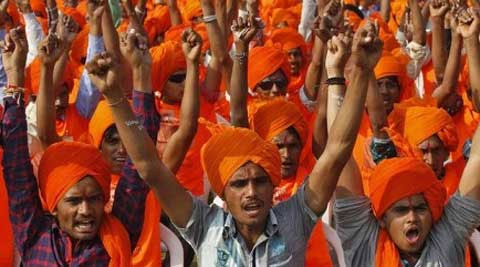- India
- International
To be a fundamentalist Hindu
That’s the only way to fight Hindu fundamentalists.
 There is nothing wrong with the religions; it is only those who exploit them for their territorial or temporal purposes who are guilty.
There is nothing wrong with the religions; it is only those who exploit them for their territorial or temporal purposes who are guilty.
That’s the only way to fight Hindu fundamentalists.
Yes, I am a fundamentalist Hindu. No, not a Hindu fundamentalist, but a fundamentalist Hindu. Let me explain.
According to Wikipedia, fundamentalism as a movement arose in the United States among conservative Presbyterian theologians in the late 19th century and soon spread to the Baptists and other denominations around 1910-20. Its purpose was to reaffirm five key theological tenets, such as the inerrancy of every word of the Bible, virgin birth of Jesus, bodily resurrection of Jesus, historical reality of Jesus’s miracles, etc. Those who subscribed to these five fundamentals came to be known as fundamentalists. Some Christian fundamentalists do not believe in the common Abrahamic origin of Christians, Muslims and Jews.
Wikipedia describes Jewish and Islamic fundamentalism as radical ideologies and suggests, how justifiably one is not sure, that the term “Islamic fundamentalist” was born as a consequence of the Iranian revolution of 1979.
About Hinduism, Wikipedia says: Hinduism is a conglomeration of distinct intellectual or philosophical points of view, rather than a rigid set of beliefs, thus the basic definition of fundamentalism cannot apply to Hinduism as a whole. It does mention “a recent phenomenon in India, namely the rise of Hindu fundamentalism that has led to political mobilisation against Muslims”.

According to the prevalent discourse on the subject, the term “fundamentalist” is used to describe those who invoke religion to indulge in acts of extremism and violence against followers of other faiths, indeed often, against followers of their own faith. These fundamentalists demand strict adherence to certain aspects of their faiths or holy books, selected by them, in order to impose their worldview on the societies they live in, and beyond.
The term “fundamentalist”, however, need not indicate such behaviour. A fundamentalist should be one who believes in the fundamentals of his or her religion, and not someone who handpicks elements from it to wage violence against all those who do not subscribe to them. Scholars of inter-faith dialogue are unanimous in their opinion that the fundamental message of all faiths is the same: universal peace, brotherhood, compassion, tolerance, etc. In that sense, those who believe in the fundamentals of their respective religion ought to be described as “fundamentalists”.
Fundamentally religious persons are not necessarily religious fundamentalists; they are not extremists and hence do not subscribe to violence to force others to their points of view. The Hindu faith does not have one single sacred text or founder. Therefore, one cannot refer to any text to ascertain the fundamentals of Hinduism. This may be both a handicap and an asset. On balance, I believe it is an advantage. It suggests that observance of rituals is not at all essential to being a Hindu. My father-in-law never went to temples, but he was a good Hindu since he respected the fundamentals of the faith he was born in. (He was also called a “true Christian” by his American friends when he went to the US for higher studies.) Of course, many Hindus do go to temples, but that in itself does not make them good Hindus.
So, what are the fundamentals of Hinduism? One of them is “non-attachment” or “anasakti” as it is called in the Gita. One’s only right is to do one’s duty, without worrying about the fruit of one’s action. This sounds noble, but is extremely difficult to practice for mortal humans. We are often disappointed when our efforts don’t yield expected results.
There is also the doctrine of reincarnation or rebirth, which cannot be proved (or disproved). A Hindu does not have to believe in it to be regarded as a Hindu. The underlying rationale is that it provides an incentive to people to behave well in the present life in the belief that in the next birth, they will be born in better circumstances. The theory of rebirth is not fundamental to the Hindu faith.
The core of Hinduism is tolerance: tolerance for other faiths, tolerance for others’ opinions, tolerance for different and opposing points of view, tolerance for other races and ethnicities, tolerance for other creeds. Even among the Hindus, there are many deities and sects such as Shaivism and Vaishnavism, and all of them coexist peacefully.
All this is not an attempt to establish the superiority of the Hindu faith over others, but merely to suggest that sticking to the fundamentals of faith, any faith, is the key to combat fundamentalism. There is nothing wrong with the religions; it is only those who exploit them for their territorial or temporal purposes who are guilty.
Rituals are useful only to the extent that they might help in understanding the fundamentals, but they ought not to be allowed to replace core teachings. The only way to fight Hindu or any other faith’s fundamentalists is to become a fundamentalist Hindu, or that of any other religion.
The writer is India’s former permanent representative at the UN, and adjunct senior fellow, Delhi Policy Group
EXPRESS OPINION
Apr 25: Latest News
- 01
- 02
- 03
- 04
- 05










































